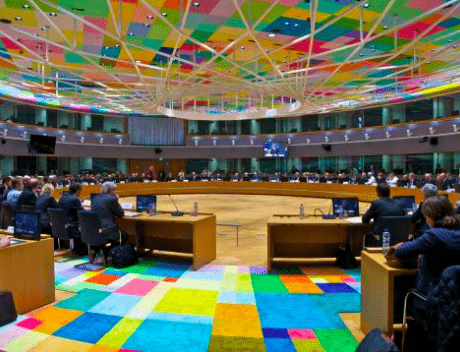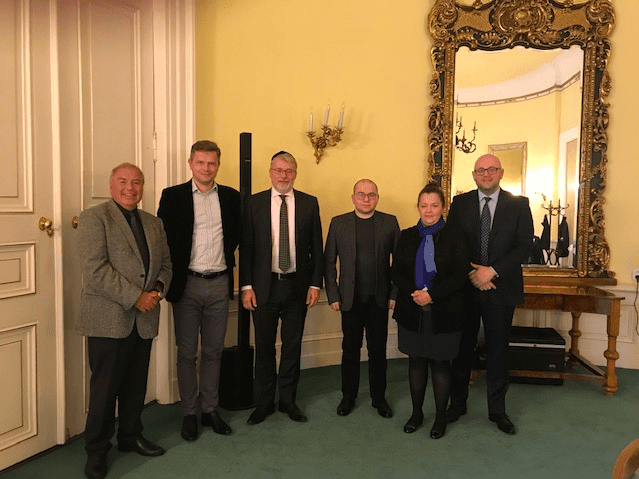Following up on the videoconference on 10 March 2020 between European Council Members, as well as the ECB President, the Eurogroup President and the High Representative, the Eurogroup held an in-depth discussion today, together with non-Euro Area Members, on how to respond to the extraordinary human and economic crisis caused by the Corona virus.
The Eurogroup expressed its sympathy and solidarity with the citizens and the Member States particularly hit by this crisis and its gratitude to those risking their own health to save lives. The Eurogroup is following the situation very closely and is in permanent contact and coordinated to give a strong economic policy response to the exceptional situation. Our commitments of today reflect our strong determination to do whatever it takes to effectively address the current challenges and to restore confidence and support a rapid recovery.
Today, we welcomed all the measures taken by Member States and by the European Commission, in particular those taken to ensure that health systems and civil protection systems are adequately provided for to contain and treat the disease, preserve the wellbeing of our citizens and help firms and workers that are particularly affected.
Facing these exceptional circumstances, we agreed that an immediate, ambitious and co-ordinated policy response is needed. We have decided to act and will respond swiftly and flexibly to developments as they unfold. We will make use of all instruments necessary to limit the socio-economic consequences of the COVID-19 outbreak. We have therefore put together a first set of national and European measures while setting a framework for further actions to respond to developments and to support the economic recovery. Preliminary estimates of the European Commission show that total fiscal support to the economy will be very sizeable. We have, so far, decided fiscal measures of about 1% of GDP, on average, for 2020 to support the economy, in addition to the impact of automatic stabilisers, which should work fully. We have, so far, committed to provide liquidity facilities of at least 10% of GDP, consisting of public guarantee schemes and deferred tax payments. These figures could be much larger going forward.
The following measures are part of our co-ordinated responses to protect our economies.
1. All national authorities will allow automatic stabilisers to function and in addition implement all necessary measures to ensure that the economic consequences of COVID-19 are tackled and that they do not put in danger our economic and social achievements. To the extent required by the evolving situation in each country, they will implement temporary measures such as:
-
- Immediate fiscal spending targeted at containment and treatment of the disease. Adequate resources will be provided to our health sectors and civil protection systems;
- Liquidity support for firms facing severe disruption and liquidity shortages, especially SMEs and firms in severely affected sectors and regions, including transport and tourism – this can include tax measures, public guarantees to help companies to borrow, export guarantees and waiving of delay penalties in public procurement contracts;
- Support for affected workers to avoid employment and income losses, including short-term work support, extension of sick pay and unemployment benefits and deferral of income tax payments.
2. Coordinated efforts at the European level will supplement national measures:
-
- We welcome the Commission’s proposal for a €37 billion “Corona Response Investment Initiative” directed at health care systems, SMEs, labour markets and other vulnerable parts of our economies, and to make a further €28 billion of structural funds fully eligible for meeting these expenditures. We agreed on the need to implement the necessary legislative changes as quickly as possible;
- We welcome the initiative of the Commission and the EIB Group to mobilise up to €8 billion of working capital lending for 100,000 European firms, backed by the EU budget, by enhancing programmes for guaranteeing bank credits to SMEs. We also support the ongoing efforts of the Commission and the EIB Group to increase this amount to up to €20 billion, which would reach a further 150,000 firms. We also welcome the ongoing work to make further funds available as swiftly as possible and to enhance the flexibility of the financial instruments leveraged;
- We welcome the initiative of the EIB Group to catalyse €10 billion in additional investments in SMEs and midcaps for their own account and to accelerate the deployment of another €10 billion backed by the EU budget;
- We invite the EIB to further enhance and accelerate the impact of the available resources, including through enhanced collaboration with the National Development Banks;
- We also welcomed the package of monetary policy measures taken by the ECB last week aimed at supporting liquidity and funding conditions for households, businesses and banks, help the smooth provision of credit to the real economy, and avoid fragmentation of euro area financial markets in order to preserve the smooth transmission of monetary policy.
3. Beyond the immediate, targeted response, we are working on all the necessary measures, to help the economy recover once the coronavirus has receded. We acknowledge the need to reflect on the resilience of our European strategic value chains to better protect Europe from product and capital market disruptions in the future. We have already significantly strengthened our crisis management framework, including with the establishment of the ESM. Today we recommit to continue our work to further strengthen the architecture and resilience to shocks of the Economic and Monetary Union.
Our shared rules will support this response. In particular, we discussed the application of the SGP, state aid rules and prudential rules:
- The economic shock of the coronavirus, with an economic contraction now expected this year, together with the cost of our agreed measures, will have a substantial budgetary impact. The SGP has the flexibility needed to cater for this situation and we will make full use of this flexibility in all member states.
- Automatic stabilisers will fully play their role. This means that automatic revenue shortfalls and unemployment benefit increases resulting from the drop in economic activity will not affect compliance with the applicable fiscal rules, targets and requirements. In addition, we agreed that the budgetary effects of temporary fiscal measures taken in response to COVID-19 will be excluded when assessing compliance with the EU fiscal rules, targets and requirements. This includes the budgetary impact of temporary and targeted measures, such as those urgently needed to contain and treat the pandemic, ensure liquidity support to firms and sectors, and protect jobs and incomes of affected workers. The flexibility to cater for unusual events outside the control of government is applicable to the current situation. We welcome the readiness of the Commission to activate the general escape clause, allowing for further discretionary stimulus, while preserving medium-term sustainability.
- We welcomed the Commission guidance on the scope for supporting firms that is available within state aid rules in the current circumstances, together with the Commission announcement that it has accelerated its state aid approval processes. The Commission has announced it will approve additional measures needed to remedy this serious disturbance in the economy, which is already the case for Italy and increasingly across the EU. Taking urgent action and making full use of the flexibility foreseen in the state aid rules is necessary to cushion the effect of the crisis for those companies and sectors which are affected, whilst ensuring a consistent framework and a level playing field in the single market. The Commission stands ready to issue a specific framework shortly.
- The banking system has a key role in preventing this health emergency from turning into a social and economic crisis for businesses and households. We therefore welcomed the statement by the European Banking Authority that competent authorities should make full use, where appropriate, of the flexibility embedded in existing regulation to support the banking sector in view of the current exceptional circumstances.
- In particular, we also welcomed the decisions taken by ECB Banking Supervision providing temporary capital and operational relief to euro area banks, with a view to ensuring that supervised banks can continue to fulfil their role in funding the real economy as the economic effects of the coronavirus become apparent. Such flexibility is needed to avoid, as much as possible, pro-cyclical, unintended consequences for the financial sector.
We will take whatever further coordinated and decisive policy action is necessary, including fiscal measures, to support growth and employment.















